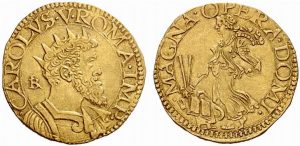Charles V
 Charles V (Span., Carlos; 24 February 1500- 21 September 1558) was both Holy Roman Emperor from 1519 to 1556, leader of the Spanish Empire and the former Duchy of Burgundy from 1516 to
Charles V (Span., Carlos; 24 February 1500- 21 September 1558) was both Holy Roman Emperor from 1519 to 1556, leader of the Spanish Empire and the former Duchy of Burgundy from 1516 to
1556, and king of
Italy. His kingdom held power over Europe, America and Asia. He was the first emperor described as “the empire on which the sun never sets” and “the world emperor .”
He was a powerful leader and significant figure during the church reformations in Europe. His goal was to uphold the Roman Catholic faith and oppose the spread of Protestantism. In addition, he battled with the Ottoman Empire.
On 19 April 1521, Charles called Martin Luther to the Diet of Worms because Pope Leo X found out forty one errors in Martin Luther’s Ninety-five Theses with other his articles. Thus the emperor summoned Luther. However, Charles then left for Spain as Holy Roman Emperor. He was against Luther, but also was preoccupied by foreign wars. Charles fought against Francis I, King of France, over Burgundy and Milan personally. He visited Henry VIII, and his imperial coronation happened at Bologna (1530), the lastemperor to be received by a pope. When Charles back to Germany in 1530, the
Knights’ Revolt and Peasants’ War had passed. For the Reformation his most important chivalric gesture came at Worms, where he honored his safe-conduct to Luther as the Second Diet of Worms instead of arresting him as suggested by his advisers, who reminded him that Emperor Sigismund (1410–1437) had not honored his word to Jan Hus.
In 1531, German Protestant princes formed the Schmalkald League for their own military and religious interests. From 1532 to 1541, war and diplomacy kept Charles in Germany. Charles supported the Council of Trent to begin the Counter-Reformation after he won the German Protestant princes in 1545. One year later, he outlawed the Schmalkaldic League. In 1547, defeated the leaders of the league, John Frederick, Elector of Saxony and Philip of Hesse in the Battle of Mühlberg. However, after four years, France united with the North German rebels, then Charles’ empire was shattered. Finally, he was forced to concede the Peace of Augsburg of 1555, which divided Germany on confessional lines.
Charles hoped to solve the religious problems following his apparent political triumph. At the Augsburg Interim in 1548, he created a solution giving certain allowances to Protestants until the Council of Trent would restore unity. However, both of sides did not follow him. The Council of Trent ended their first meetings in 1551 without a clear statement of faith, and didn’t return until 1562.
In 1556, he abdicated as Holy Roman Emperor in favor of his brother Ferdinand. In August 1558 Charles was taken seriously ill and died on 21 September 1558 in malarial fevers.
Reference
The European Reformations Sourcebook. Edited by Carter Lindberg.(Oxford,2014)
Kleinschmidt, Harald. Charles V: The World Emperor
External links
Charles V (Encyclopaedia Judaica, 2007)
Charles V (Encyclopædia Britannica Online, 07/2016)